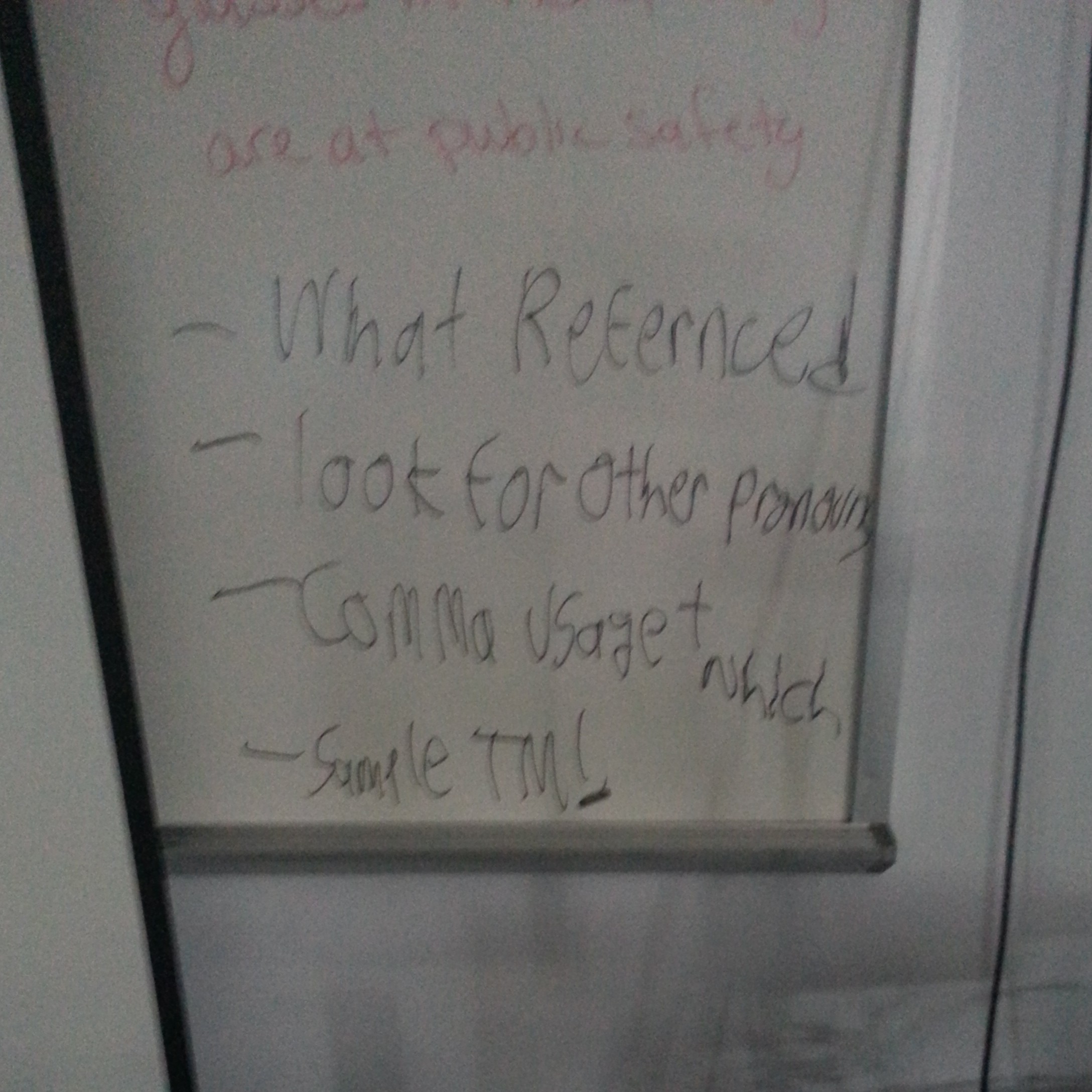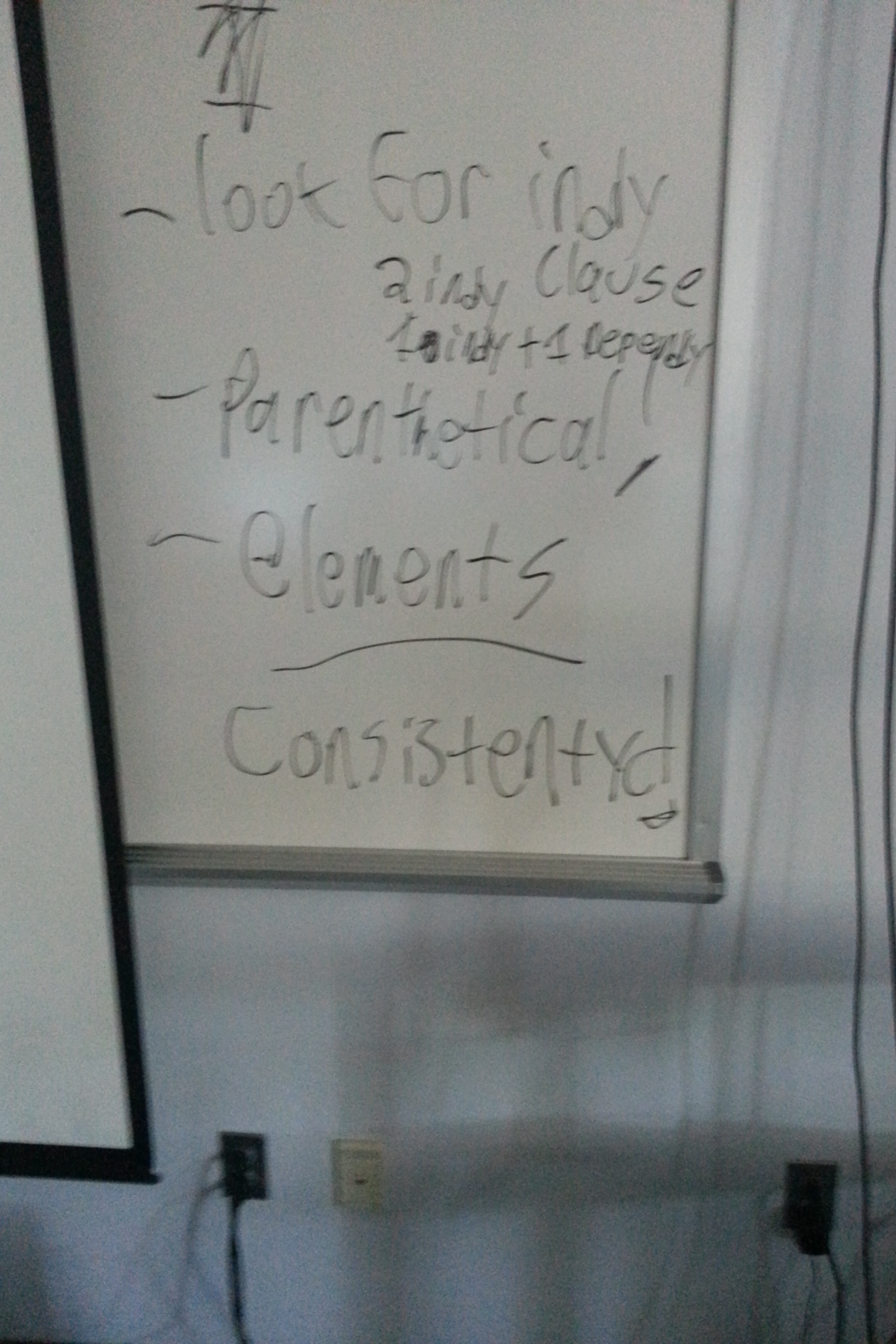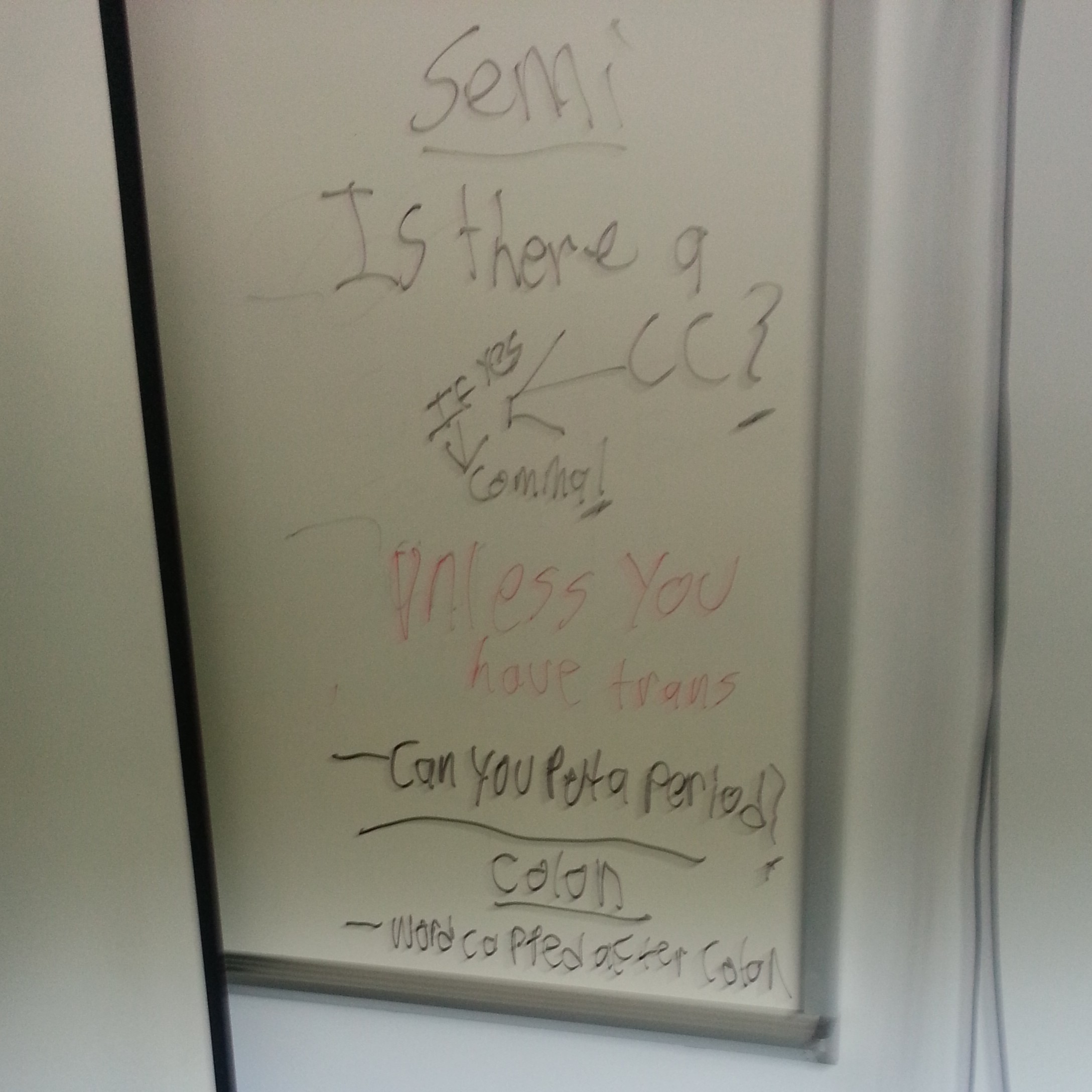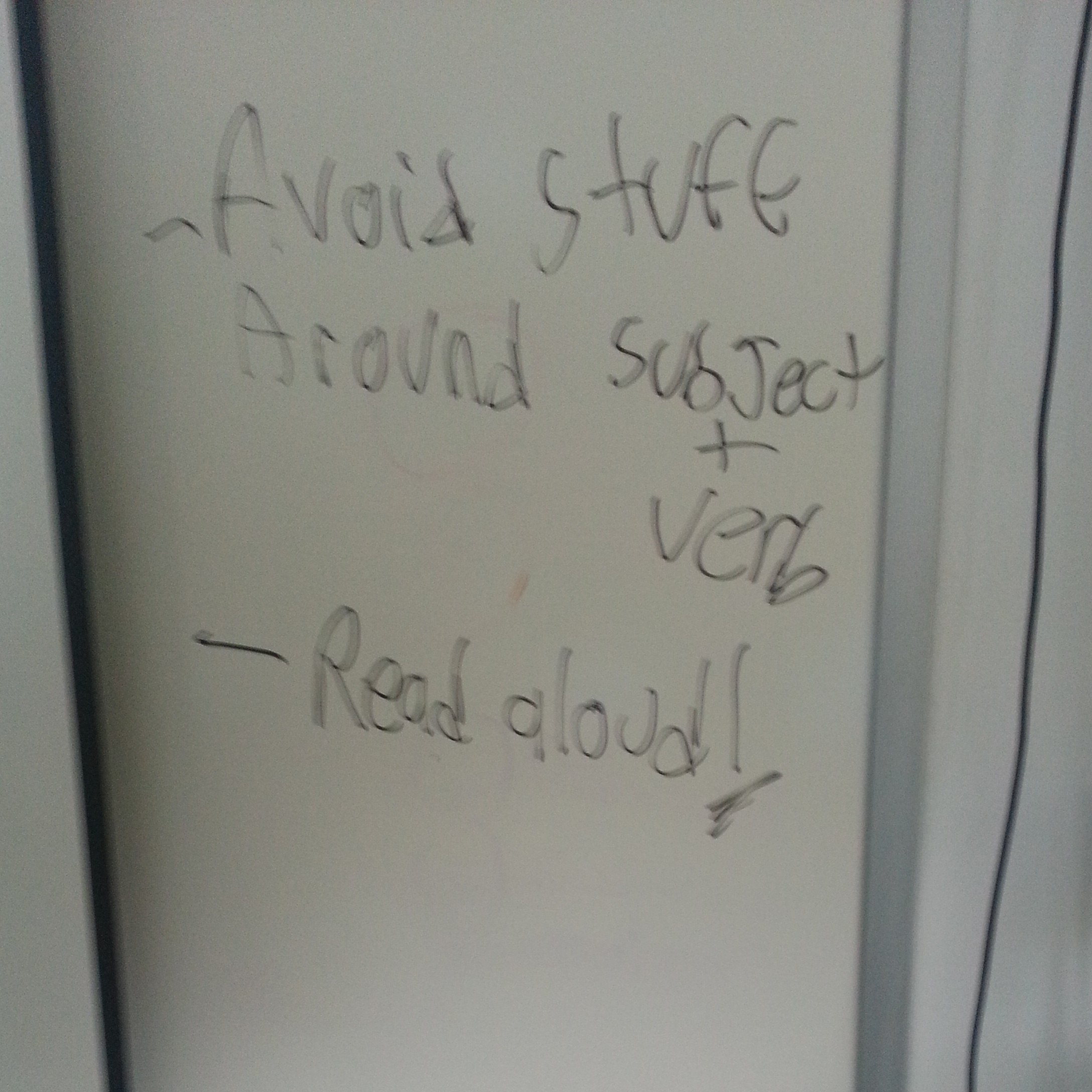During the fall semester, I put together a student committee to update my revision policy, which really needed some work after becoming stale. After a few Skype sessions and brainstorming on a document, here is what they came up with with me:
I strongly believe one of the most important lessons I learned about writing was that quality work almost always entails rewriting, but also reflection on what lessons can be learned and implemented in future writing. In this class, in place of a straight paper revision, you will analyze the mistakes I noted in comments on your paper and write a response discussing the comments and how you would correct them in future writing. This means if you are not satisfied with your grade, you may submit a response (directions are below), shared to my school Google Drive (wwend@bcc.edu), within 3-5 days after I comment on your paper.
My expectation that for every mistake you are fixing, there is a brief paragraph discussing how to correct your work. I would consider directly citing our book readings (and the writing manual from ENG101) or your notes from class discussions in this response. Please do not cite random writing from the world wide web. There should be a second paragraph discussing specifically how you would fix it in your own essay as well.
If you are unsure what to write about, you can always schedule an appointment during office hours whether in person or electronic. Regardless, I would strongly suggest meeting with me to make sure you understand your grade and how to improve it.
Anywhere between one (1) to three (3) points can be added to your paper proportionally depending on the overall point total of the paper.
Of course, there are no revisions on term papers. Also, you may not use your revision to correct a plagiarized paper (see academic honesty policy below). Finally, revisions on your citation practice assignment do not count towards your revision. (Revised Fall 2015 by HC, DH, TC)
New Writing Policy
As I always do at the end of the year, I had a group of students look over and help me revise some of my syllabus policy. This year I decided my general writing policy was long overdue for a makeover. After some discussion, we decided to merge my previous section on makeup work into the new writing policy as well. I am proud of the work my students did on this and look forward to the new collaboration on my syllabus policy.
Here is the new policy...
Writing Updated Spring 2015 by AB, CD, and MW
My expectation for this class is that all of your work will be free of errors. Papers, projects, etc should be proofread for spelling, mechanics, and grammar. I will mark down for these errors: Please do an exhaustive job of proofreading and revision. All papers should follow standard MLA 7 formatting: Typed; titled; double spaced; page numbers, with your last name, in the top right hand corner; and a page break before your works cited page. All papers will be digitally shared via Google Drive by 23:59 to my school email (wwend@bcc.edu) on the due date. I will not be accepting print copies of your papers. No matter the email students submit their work from, all work will be returned to their school email.
If you use Microsoft Works, please convert your file (.wps) to something more accessible (.odt or .doc is fine) before submitting your paper. Same goes for .pages files. Please do not submit a .pdf file.
Upon sharing your paper via Google Drive, do not consider your paper submitted until, if and only if, you receive a confirmation reply (usually within 24-48 hours). If you do not receive a confirmation email, it is the student’s responsibility to get in touch with me about their work. I am not responsible for making sure you hand in your assignments.
Please make sure you are backing up your work to an external hard drive, flash drive, cloud based source, or other backup method. I will not accept excuses involving crashed computer or broken files.
Please follow the “24 hour rule” for graded work. I do not discuss returned student work until 24 hours have elapsed since I returned them. There will be no discussion, in person or via email, until that time window has elapsed.
All submitted work should be completed by the due date. Please consult the extension policy for details about asking for, and receiving, an extension. With prior permission to submit late work, a full letter grade will be taken off for each day that it is late.
How My Students Helped Me Look For Grammar Clues During The Fall Semester




A rather successful endeavor in the fall semester was looking to add a "look for clues" slide to my grammar slide sets for Composition I. Some of my slide sets had a slide like this already, but others did not so I decided to make it a point of emphasis for the fall semester. With the help of my two sections of Composition I, I was able to add a list of clues for the remaining sets that did not have them. Sometimes this came directly from a student question during group work or discussion and sometimes it came directly from me. I am grateful for my students and their assistance in getting this done.
Updated Technology Policy
As I have done in the past, this year I formed a student committee to work with me in rewriting some of my classroom policies. This year, I decided that my technology policy, even though only a few years old, needed to be amended, updated, and changed in various ways. With the help of my student committee Nicole Cammarota, Meghan McCallister, Lauren Graham, and Matthew Shoppas, we met once in person and then edited a shared Google Doc. After some editing on my part, this is what I ended up with:
Technology Policy
Please mute your cell phone BEFORE entering the classroom. If your cell phone goes off more than once while class is in a session, you will be asked to leave. I fully encourage whatever technology suites your learning style, accommodations, or interests whether they are laptops, tablets, apps on smart phones, etc, as long as they do not distract from our purpose in the classroom. Paper is totally fine too.
With that being said, during opening and closing remarks in class focus should be away from technology and on discussing our goals and outcomes for the day. Please remove all ear buds before entering class and keep them removed until you leave the room at the end of class.
In my classes, I have an expectation students will have access to email and computers in general. All of your work will be submitted to via your BCC Gmail account and returned, with annotated comments, via Google Drive. Given there are public and school libraries, the ILRC, coffee shops, etc, students need to budget their time better; I do not see any excuse for having “no access” to email outside of the classroom.
Students are expected to check their BCC Gmail account on a regular basis. I do not accept the excuse, “I didn't check my email for two weeks” as a valid problem. Digital correspondence should be written using proper grammar and form. I will not reply to emails filled with texting speak (2, u, 4, lol, j/k) or poor grammar and/or misspellings.
Please include a subject and "sign" your email with your name, student ID number, and course section. If you miss class, please check the syllabus for information about assignments, due dates, and outcomes from class. Do not email the professor and ask “did we do anything in class today?” or any variations on that theme.
Team Extension Policy
One of the best decisions I made during the fall semester was allowing students to dictate new class policy. Before this semester, I had never really had a formal policy about extensions. The few students who asked for them did it in a timely and respectful manner. In the fall, I began to have students asking for them the day a paper was due and even days afterward. This was intolerable and I decided that I needed to brew a new extension policy.
Then an idea came to me. Why was I writing it? The policy will be one that my students use, so why not let them do it? I took three of my best students and put them in “Team Extension Policy” to create a new policy for extensions. My students spent about two weeks emailing back and forth and having a rather vigorous debate about what should go into the policy. I spoke with each in person (but never all at once; unfortunately, only two of them could meet in person) and I took notes on their emails as they worked out the intricacies of various issues.
Finally, I drafted policy and showed it to both Team Extension Policy and our Paralegal Director Sherrie Block. After some suggestions from both, and a few final in person discussions, we came up with this:
Extension Policy
Extensions are gifts, not a right. College work involves responsibility
and ownership over your individual situation. With that in mind, here
are a few caveats about extensions. First, I need to know 48 hours
before an assignment is due if you need an extension. This will be
clearly addressed on the class schedule. To apply for an extension, we
must speak in person or over email immediately. A rough draft of your
paper in progress will be required to be handed in at this time. I will
then decide whether to grant or deny the extension and how much time
would be allotted for it.
To apply for an extension beyond the 48 hour mark for reasons of hospitalization, bereavement, military service, observance of religious holidays, legal reasons (jury duty, etc), or work related issues (ie: getting called into work at the last minute), written documentation not given before the due date must be in by Saturday night after the due date.
For the following reasons, extensions will not be permitted: short term illnesses and family vacations.
Only one extension will be granted per semester, although an “emergency” extension can be granted under certain circumstances.
Crowdsourcing My Grammar Exam
A recent Profhacker post about reliance on test banks for exam questions prompted a lot of discussion in the adjunct office at my school. My, rather negative, thoughts on test banks are for another post, but this situation in Florida has made me even more proud of my crowdsourcing effort for the grammar exam in eng101.
Here’s what I do: At the beginning of the semester, I give my students in Composition I (eng101 ) a brief (too brief…it needs to be revised during break to be clearer about my expectations) handout asking them to create a sentence for each of the six sections of grammar we study during the first two months of the semester. Later in the semester, after we finish our final discussion of grammar, students must submit one sentence for each section of grammar. I take those, grade them for participation, and then copy/paste the best, or worst, sentences into each section of the exam. If I run short of good, or bad, sentences, I add them myself or bring back questions from quizzes that a lot of students had trouble with during the semester. This becomes the grammar exam.
My students have found this a very interesting way to engage with grammar. Many express excitement, and will comment as such in the margins, at their sentence, or some version of it, being used on the exam. Others have commented that writing your own questions offers supplemental practice that is absolute necessary for many of them. Some just think it’s cool having agency over what goes into the exam. Finally, I get to see what is, and is not, important to that particular set of students that particular semester.
This kind of participatory education is something I believe very strongly in. I am working on other ways to incorporate my students in the decision-making process in my classroom. I strongly prefer democratic participation over mindless regurgitation of facts and ideas from a textbook.